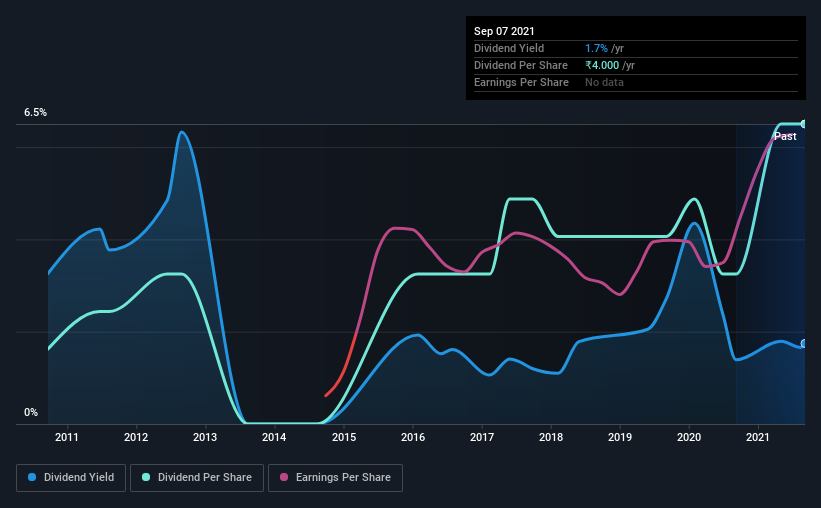The board of NCL Industries Limited (NSE:NCLIND) has announced that it will pay a dividend of ₹1.00 per share on the 28th of October. The dividend yield will be 1.7% based on this payment which is still above the industry average.
View our latest analysis for NCL Industries
NCL Industries' Dividend Is Well Covered By Earnings
If the payments aren't sustainable, a high yield for a few years won't matter that much. Before making this announcement, NCL Industries was easily earning enough to cover the dividend. This means that most of its earnings are being retained to grow the business.
Over the next year, EPS could expand by 24.0% if recent trends continue. If the dividend continues on this path, the payout ratio could be 10% by next year, which we think can be pretty sustainable going forward.

Dividend Volatility
The company's dividend history has been marked by instability, with at least 1 cut in the last 10 years. The dividend has gone from ₹1.00 in 2011 to the most recent annual payment of ₹4.00. This means that it has been growing its distributions at 15% per annum over that time. Despite the rapid growth in the dividend over the past number of years, we have seen the payments go down the past as well, so that makes us cautious.
The Dividend Looks Likely To Grow
Given that the dividend has been cut in the past, we need to check if earnings are growing and if that might lead to stronger dividends in the future. It's encouraging to see NCL Industries has been growing its earnings per share at 24% a year over the past five years. Rapid earnings growth and a low payout ratio suggest this company has been effectively reinvesting in its business. Should that continue, this company could have a bright future.
NCL Industries Looks Like A Great Dividend Stock
In summary, it is good to see that the dividend is staying consistent, and we don't think there is any reason to suspect this might change over the medium term. The company is easily earning enough to cover its dividend payments and it is great to see that these earnings are being translated into cash flow. Taking this all into consideration, this looks like it could be a good dividend opportunity.
Investors generally tend to favour companies with a consistent, stable dividend policy as opposed to those operating an irregular one. Still, investors need to consider a host of other factors, apart from dividend payments, when analysing a company. Taking the debate a bit further, we've identified 2 warning signs for NCL Industries that investors need to be conscious of moving forward. If you are a dividend investor, you might also want to look at our curated list of high performing dividend stock.
If you decide to trade NCL Industries, use the lowest-cost* platform that is rated #1 Overall by Barron’s, Interactive Brokers. Trade stocks, options, futures, forex, bonds and funds on 135 markets, all from a single integrated account. Promoted
Valuation is complex, but we're here to simplify it.
Discover if NCL Industries might be undervalued or overvalued with our detailed analysis, featuring fair value estimates, potential risks, dividends, insider trades, and its financial condition.
Access Free AnalysisThis article by Simply Wall St is general in nature. We provide commentary based on historical data and analyst forecasts only using an unbiased methodology and our articles are not intended to be financial advice. It does not constitute a recommendation to buy or sell any stock, and does not take account of your objectives, or your financial situation. We aim to bring you long-term focused analysis driven by fundamental data. Note that our analysis may not factor in the latest price-sensitive company announcements or qualitative material. Simply Wall St has no position in any stocks mentioned.
*Interactive Brokers Rated Lowest Cost Broker by StockBrokers.com Annual Online Review 2020
Have feedback on this article? Concerned about the content? Get in touch with us directly. Alternatively, email editorial-team (at) simplywallst.com.
About NSEI:NCLIND
Flawless balance sheet average dividend payer.
Similar Companies
Market Insights
Community Narratives



